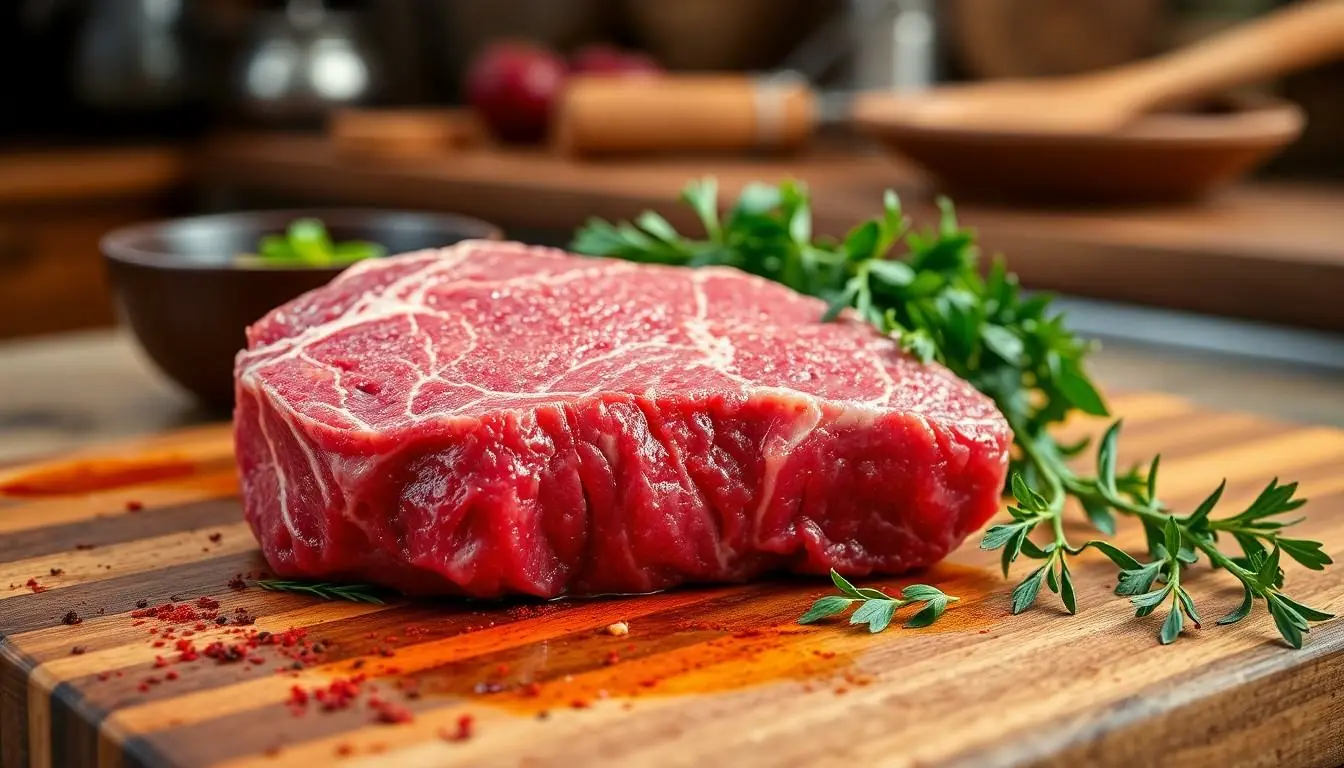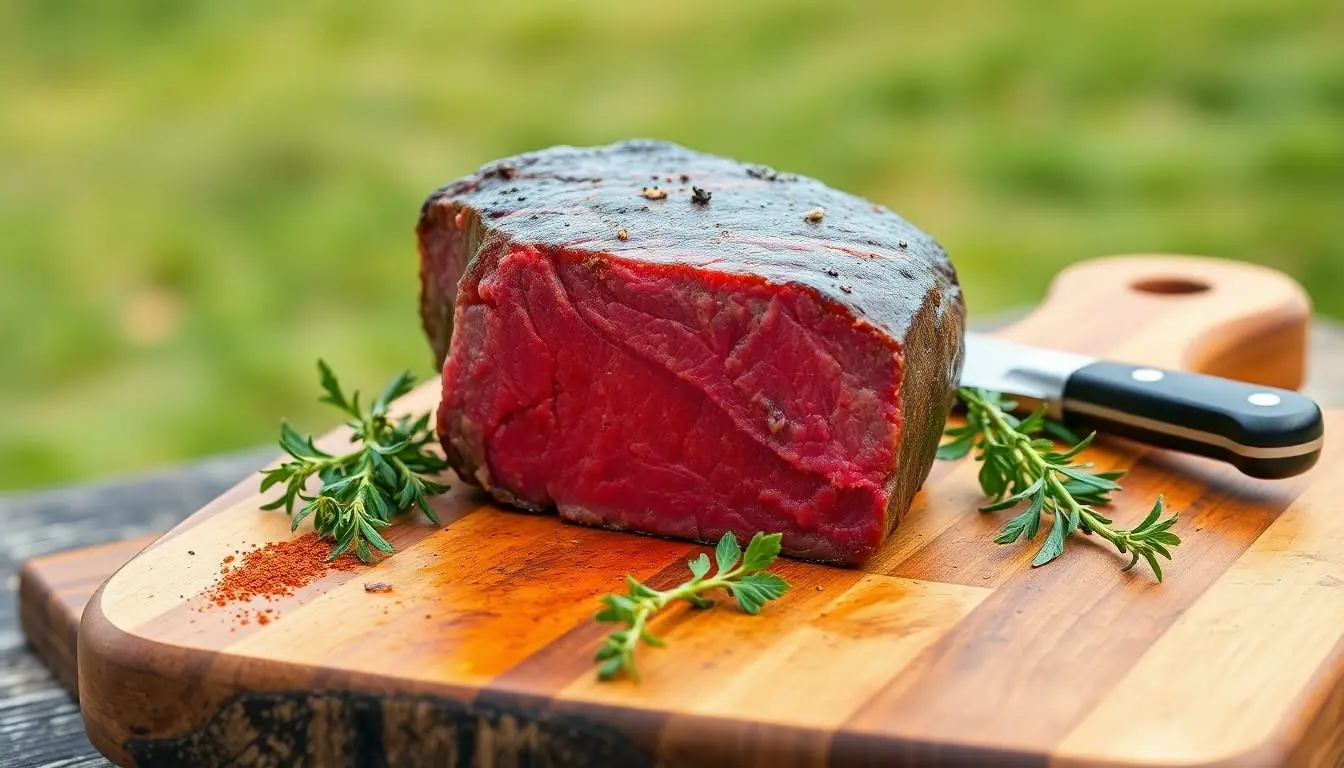When it comes to meaty delights, bison often gets overshadowed by its more popular cousin, beef. But hold on to your forks because this mighty creature packs a nutritional punch that’s hard to ignore. If you’re looking to spice up your dinner plate and impress your taste buds, bison might just be your new best friend.
Table of Contents
ToggleOverview Of Bison Nutrition Facts
Bison offers a significant nutritional profile that appeals to health-conscious individuals. It contains about 143 calories per 100 grams, making it leaner than beef. Protein content stands at approximately 28 grams per serving, which supports muscle growth and overall health.
Fat content varies but averages around 2.4 grams per 100 grams, with lower saturated fat levels than many other red meats. Iron is abundant in bison, providing about 2.6 mg per serving, contributing to improved oxygen transport in the body.
Bison also supplies essential vitamins and minerals. Vitamin B12 levels reach about 2.6 µg per serving, playing a key role in nerve function and energy metabolism. Zinc is present at approximately 4.2 mg, which supports the immune system and wound healing.
Omega-3 fatty acids are relatively low in bison; however, grass-fed varieties may offer improved levels compared to conventional beef. These healthy fats support heart health and cognitive function.
With its rich flavor and versatile culinary uses, bison can replace red meats in various dishes. Perfectly suitable for grilling, roasting, or slow cooking, bison meets diverse taste preferences. Bison meat can be part of a balanced diet, providing nutrients without excessive calories or unhealthy fats.
Nutritional Profile Of Bison

Bison provides a rich array of nutrients that contribute to its status as a healthy alternative to beef. This section covers bison’s macronutrient and micronutrient content.
Macronutrients
Bison typically contains around 143 calories per 100 grams serving. Protein content is significant, averaging 28 grams, making it an excellent choice for muscle repair and growth. Fat levels are relatively low at approximately 2.4 grams, contributing to its lean meat classification. Bison also offers a favorable ratio of unsaturated fats, which can benefit heart health. Carbohydrate content remains minimal, providing essential amino acids while promoting a low-calorie meal option.
Micronutrients
Bison is packed with vital vitamins and minerals. Iron content is noteworthy, supporting oxygen transport in the body. Additionally, bison supplies a generous dose of vitamin B12, crucial for nerve function and red blood cell production. Zinc levels are high, playing a key role in immune function and wound healing. While bison contains small amounts of omega-3 fatty acids, grass-fed varieties may deliver enhanced levels. Such micronutrients contribute to overall health and make bison a valuable inclusion in a balanced diet.
Health Benefits Of Bison
Bison offers numerous health benefits that make it a compelling choice for a balanced diet. Its nutritional profile provides valuable nutrients essential for overall wellness.
Protein Content
Bison contains approximately 28 grams of protein per 100 grams. This high protein content supports muscle growth and repair. It’s especially beneficial for those engaging in regular physical activity. Protein also aids in weight management by promoting satiety. The amino acids found in bison contribute to various bodily functions, enhancing metabolic processes. Consuming bison can fulfill daily protein requirements without excessive calories. Lean protein sources like bison are ideal for individuals aiming to maintain or lose weight effectively.
Lower Fat Levels
Bison contains only about 2.4 grams of fat per 100 grams, making it a heart-healthy meat option. Lower fat levels reduce the risk of heart disease and other health issues commonly associated with saturated fats. It’s also a suitable alternative for those looking to limit unhealthy fat intake. The favorable unsaturated fat ratio in bison supports cardiovascular health. Furthermore, with fewer calories than many other meats, bison allows individuals to enjoy flavorful meals without the guilt. Choosing bison promotes a balanced diet with essential nutrients while minimizing unhealthy fat consumption.
Comparison With Other Meats
Bison stands out when compared to common meats like beef and chicken, showcasing its unique nutritional profile.
Bison Vs. Beef
Bison is leaner than beef, containing approximately 143 calories and 28 grams of protein per 100 grams. The fat content in bison averages about 2.4 grams, while beef generally contains higher fat levels. Bison also provides more iron, vitamin B12, and zinc, essential for energy production and immune function. Athletes and active individuals benefit from bison’s high protein content and low calorie count. While both meats present culinary versatility, bison’s reduced fat makes it a heart-healthy alternative without sacrificing flavor.
Bison Vs. Chicken
In comparison to chicken, bison offers greater protein density and lower fat content. Bison features around 28 grams of protein alongside minimal carbohydrates, making it suitable for various dietary needs. Chicken, while protein-rich, typically has higher fat levels depending on the cut. Bison also surpasses chicken in micronutrients like iron and zinc, contributing positively to overall health. These differences position bison as an excellent option for those seeking a flavorful yet nutritious meat choice that complements balanced diets.
Cooking And Preparation Tips
Cooking bison requires specific techniques to enhance its flavor and maintain its tenderness. Utilize lower cooking temperatures to prevent overcooking, which can lead to dryness. Consider methods such as grilling, roasting, and slow-cooking, which allow the meat to remain juicy.
Marinating bison can enrich its taste. A mixture of oil, acid, and spices works well, helping to tenderize the meat while adding flavor. Ingredients like vinegar, citrus juices, and herbs complement bison’s natural taste.
When preparing bison burgers or meatballs, incorporate breadcrumbs or oats for added texture. Create patties without overworking the meat to ensure a tender result.
For steaks, opt for seasonings that enhance the natural flavor. Simple combinations of salt and pepper often suffice, but garlic powder or smoked paprika can elevate the dish.
Resting cooked bison for a few minutes allows the juices to redistribute, ensuring the meat stays moist and flavorful. Slice against the grain for optimal tenderness and textural quality.
Cooking times differ based on the cut. A bison steak typically cooks for about 4 to 5 minutes per side on the grill, depending on the desired doneness. Aim for an internal temperature of 130°F to 140°F for a medium-rare result.
Lastly, store leftover bison properly. Refrigerate within two hours of cooking and consume within 3 to 4 days. Freezing bison extends its freshness for up to six months.
Bison stands out as a nutritious and flavorful alternative to traditional meats. Its impressive protein content and low fat levels make it an excellent choice for health-conscious individuals. With its rich supply of essential nutrients like iron and vitamin B12, bison supports overall well-being and muscle health.
Incorporating bison into meals not only enhances taste but also contributes to a balanced diet. Whether grilled, roasted, or slow-cooked, bison can be prepared in various ways to maintain its tenderness and flavor. As more people seek healthier options, bison’s unique nutritional profile positions it as a worthy addition to any diet.




